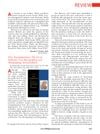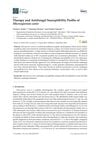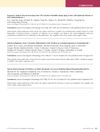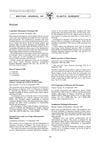 2 citations,
October 1999 in “Annals of the New York Academy of Sciences”
2 citations,
October 1999 in “Annals of the New York Academy of Sciences” Melatonin and cortisol affect mink winter hair growth, but β-endorphin levels do not.
 1 citations,
July 2022 in “Journal of Cosmetic Dermatology”
1 citations,
July 2022 in “Journal of Cosmetic Dermatology” Inflammatory complications are rare after hair transplants but can happen months later, and checking for skin conditions before surgery is important.
 1 citations,
January 2020 in “Aesthetic Surgery Journal”
1 citations,
January 2020 in “Aesthetic Surgery Journal” Platelet-rich plasma and stem cell therapies are accepted treatments for hair restoration, with specific protocols recommended for best results, but more standardization is needed in stem cell use.
[object Object]  February 2024 in “Curēus”
February 2024 in “Curēus” Topical 5-Fluorouracil can rarely cause nerve damage, especially in people with a certain genetic deficiency.
 September 2022 in “Aesthetic Surgery Journal”
September 2022 in “Aesthetic Surgery Journal” Plastic surgeons can offer various nonsurgical hair restoration treatments like minoxidil, PRP, and light treatments, but they don't give permanent results and need to be repeated. It's crucial to educate patients and manage their expectations. Hair loss in women often involves other health issues like thyroid disease.
 January 2022 in “European journal of anatomy”
January 2022 in “European journal of anatomy” A man had four testicles, two of which were outside the scrotum and looked like fatty lumps.
 July 2021 in “Aesthetic Surgery Journal”
July 2021 in “Aesthetic Surgery Journal” Using lasers and fat grafting before hair transplant improves hair growth on scarred skin.
 April 2020 in “Rheumatology”
April 2020 in “Rheumatology” Many patients with Giant Cell Arteritis did not follow their steroid treatment plans properly.
 April 2015 in “Plastic and Reconstructive Surgery”
April 2015 in “Plastic and Reconstructive Surgery” TLR3 activation helps improve skin and hair follicle healing in mice.
 January 2015 in “Plastic and Reconstructive Surgery”
January 2015 in “Plastic and Reconstructive Surgery” The book is a valuable guide for hair restoration surgeons.
June 2021 in “Aesthetic Surgery Journal” PRP improves hair growth in AGA, but higher concentrations aren't significantly better than lower ones.
 August 2014 in “Journal of clinical & experimental dermatology research”
August 2014 in “Journal of clinical & experimental dermatology research” Platelet-released growth factors can treat hair loss by activating hair follicle stem cells, blocking certain pathways, and controlling inflammation and fibrosis.
23 citations,
October 2008 in “Journal of medicinal chemistry” PF-998425 is a new, effective, and non-phototoxic treatment for skin conditions related to androgens.

Isotretinoin and tazarotene help treat acne, while minoxidil and finasteride promote hair growth.
 9 citations,
January 2017 in “Dermatology Online Journal”
9 citations,
January 2017 in “Dermatology Online Journal” Some hair loss drugs can cause a unique type of hair loss that resembles both psoriasis and alopecia.
 April 2019 in “Journal of Investigative Dermatology”
April 2019 in “Journal of Investigative Dermatology” Eating grape powder may reduce the severity of skin allergy symptoms.
 October 2010 in “Journal of Men's Health”
October 2010 in “Journal of Men's Health” The conclusion is that doctors should be careful when prescribing 5α-reductase inhibitors due to possible serious side effects, and they should discuss these risks with patients.
 43 citations,
September 2006 in “Annals of Plastic Surgery”
43 citations,
September 2006 in “Annals of Plastic Surgery” A hair wrapped tightly around an infant's toe caused severe damage, requiring early removal and possibly surgery to prevent worse outcomes like amputation.
 42 citations,
September 2018 in “Journal of Fungi”
42 citations,
September 2018 in “Journal of Fungi” Terbinafine and itraconazole are more effective against Microsporum canis than fluconazole and griseofulvin.
 20 citations,
September 2020 in “Journal of Translational Medicine”
20 citations,
September 2020 in “Journal of Translational Medicine” Mesenchymal stromal cells may help treat severe COVID-19, but more research is needed to confirm their effectiveness.
 1 citations,
September 2012 in “Journal of Investigative Dermatology”
1 citations,
September 2012 in “Journal of Investigative Dermatology” Aging reduces stem cell activation, leading to hair loss in mice lacking a specific enzyme.
[object Object]  April 2015 in “Plastic and Reconstructive Surgery”
April 2015 in “Plastic and Reconstructive Surgery” Activating TLR3 helps improve skin and hair follicle regeneration after wounds.
 November 2009 in “Medical & surgical dermatology”
November 2009 in “Medical & surgical dermatology” The document concludes that Borrelia afzelii causes a skin condition in France, a gene is linked to hair loss in Caucasian women, and various genetic mutations affect skin diseases.
 September 1998 in “British Journal of Plastic Surgery”
September 1998 in “British Journal of Plastic Surgery” The document informed plastic surgeons about upcoming educational events worldwide.
 June 2020 in “Journal of Investigative Dermatology”
June 2020 in “Journal of Investigative Dermatology” Leukocyte-rich platelet-rich plasma is safe and can potentially help treat scarring hair loss.
 205 citations,
August 2007 in “Experimental Cell Research”
205 citations,
August 2007 in “Experimental Cell Research” Stem cell niches are crucial for regulating stem cell renewal and differentiation, and understanding them can help in developing regenerative therapies.
 116 citations,
April 2002 in “American journal of veterinary research”
116 citations,
April 2002 in “American journal of veterinary research” Trilostane effectively and safely treats dogs with pituitary-dependent hyperadrenocorticism, improving symptoms and adrenal gland size.
 100 citations,
September 1999 in “British Journal of Dermatology”
100 citations,
September 1999 in “British Journal of Dermatology” The study found that two enzymes linked to hair loss are located in different parts of the scalp, supporting a common treatment's effectiveness.
 97 citations,
March 2002 in “Molecular and cellular biology”
97 citations,
March 2002 in “Molecular and cellular biology” Mutant CDP/Cux protein causes hair defects and reduced male fertility in mice.
 86 citations,
June 2017 in “Anais Brasileiros de Dermatologia”
86 citations,
June 2017 in “Anais Brasileiros de Dermatologia” Antioxidants can benefit skin health but should be used carefully to avoid negative effects.




























